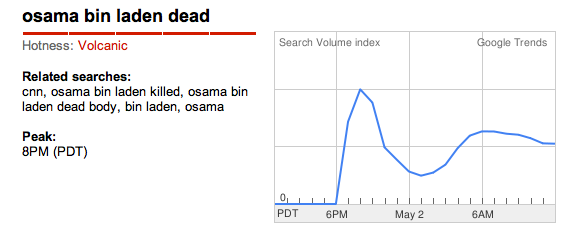Here’s what caught my attention in the search world this week.
Bing’s partnership with RIM: Will distribution lead to increased mobile search share?
Search market share isn’t just about providing great search results. It’s also about distribution. Become the default search provider in an application or on a device, and as a search engine, you’ve at least partially won the battle for those users (unless your search experience is so bad it drives users from their normal behavior of not changing defaults right to your competitor).
Google currently has 97% mobile market share in the United States, which is partially due to distribution — both with its Android OS and as the default search on the iPhone. (And consumers are increasingly interested in Android and iPhone over RIM and Microsoft Windows mobile.)
 But Bing is trying to change the market share balance, in part by becoming the default search provider on RIM BlackBerry devices. Microsoft Smartphones make up 9% of the SmartPhone market (vs. more than 50% for the combination of Android and iPhone). RIM makes up an additional 33%.
But Bing is trying to change the market share balance, in part by becoming the default search provider on RIM BlackBerry devices. Microsoft Smartphones make up 9% of the SmartPhone market (vs. more than 50% for the combination of Android and iPhone). RIM makes up an additional 33%.
Some think that Microsoft’s aggressive pursuit of distribution deals makes poor business sense:
Microsoft’s Bing search engine is indeed gaining some share of search queries in the US market (globally, Bing is nowhere). But it is gaining this share at an absolutely mind-boggling cost. Specifically, Microsoft is gaining share for Bing by doing spectacularly expensive distribution deals, deals that don’t even come close to paying for themselves in additional revenue.
How much is Microsoft spending to buy market share for Bing?
Based on an analysis of Microsoft’s financial statements, Bing is paying about 3X as much for every incremental search query as it generates in revenue from that query.
Continued personalization of Google News
Radar’s Alex Howard, writing recently about research around how we increasingly look online for political news, noted:
Polarization can express itself in how people group online and offline. As with so many activities online, political information gathering online requires news consumers to be more digitally literate. That may mean recognizing the potential for digital echo chambers, where unaware citizens become trapped in a filter bubble created by rapidly increasing personalization in search, commercial and social utilities like Google, Amazon and Facebook.
The research, conducted by the Pew Internet and Life Project, found that actually, we are exposed to a variety of viewpoints online. But those who are concerned about potential filter bubbles may be wary of new personalization features of Google News that use previous Google News activity to shape the “News for you” and a new “Recommended Sections” feature. Google says personalization uses both “subjects and sources,” so it will expose content based on topics you’re interested in (which may come from a variety of sources and viewpoints) and sources you’ve clicked on (which may be more likely to share your perspective).
Search and Osama Bin Laden
News events always cause search spikes, but the death of Osama Bin Laden caused an all out search frenzy. Yahoo reported a 98,550% increase in searches for the name on May 1, in part driven by teenagers wondering who he was.

Google Trends result for May 2, 2011.
Over on Search Engine Land, Danny Sullivan compared Google results on September 11, 2001, when Google posted a message on their home page advising searchers looking for new information to go elsewhere, vs. May 1, 2011, when a combination of news articles and tweets provided up-to-the minute news in search results. (Google’s inability to provide real-time news coverage on September 11, 2011 led to the creation of Google News.)
Related:
